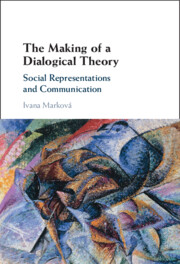Book contents
- The Making of a Dialogical Theory
- The Making of a Dialogical Theory
- Copyright page
- Contents
- Figures
- Acknowledgements
- Introduction
- Part I The Development and Diversification of the Theory of Social Representations and Communication
- Part II The Dialogical Perspective of the Theory of Social Representations and Communication
- Chapter 7 Social Representations and Common Sense
- Chapter 8 Meanings and Knowledge as Semiotic Processes
- Chapter 9 They ‘Made Flowers Grow Where It Seemed Impossible’
- Chapter 10 Social Representations as Unique Phenomena:
- Chapter 11 The Making of Dialogical Theories
- Afterword
- References
- Index
Chapter 8 - Meanings and Knowledge as Semiotic Processes
from Part II - The Dialogical Perspective of the Theory of Social Representations and Communication
Published online by Cambridge University Press: 22 June 2023
- The Making of a Dialogical Theory
- The Making of a Dialogical Theory
- Copyright page
- Contents
- Figures
- Acknowledgements
- Introduction
- Part I The Development and Diversification of the Theory of Social Representations and Communication
- Part II The Dialogical Perspective of the Theory of Social Representations and Communication
- Chapter 7 Social Representations and Common Sense
- Chapter 8 Meanings and Knowledge as Semiotic Processes
- Chapter 9 They ‘Made Flowers Grow Where It Seemed Impossible’
- Chapter 10 Social Representations as Unique Phenomena:
- Chapter 11 The Making of Dialogical Theories
- Afterword
- References
- Index
Summary
8. From early formulations of this theory, Moscovici viewed ‘meaning’ and ‘knowledge’ as semiotic processes and expressed them as a triadic model in two formulations. The two formulations of the triadic model are complementary. First, in the figurative equation ‘representation = figure/signification’, Moscovici foregrounded the infinite meaning- and knowledge-making processes of social representations through objectification and anchoring. The figurative equation can be represented as a triad involving representation, figure, and signification. Both Peirce’s and Moscovici’s triadic models form wholes in which their elements are linked in and through indivisible relations. Signs and symbols are expressed through various means, among which name-giving is particularly notable. Changing the name implies a symbolic effort to change the identity of the bearer of that name and signifies the Self’s attempt to belong to a group or to specific Others. Divergencies between ‘meanings’ and ‘knowledge’ in professional practices have the potential to inspire intervention practices in fields such as health, education, and therapies.
The second formulation of the triadic model is expressed in the Ego–Alter–Object, which refers to the theory of social representations and communication as a theory of social knowledge.
- Type
- Chapter
- Information
- The Making of a Dialogical TheorySocial Representations and Communication, pp. 178 - 194Publisher: Cambridge University PressPrint publication year: 2023



